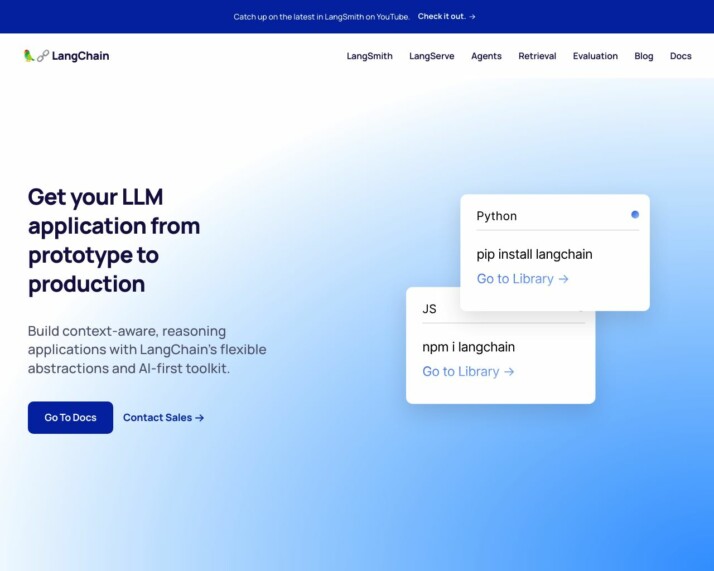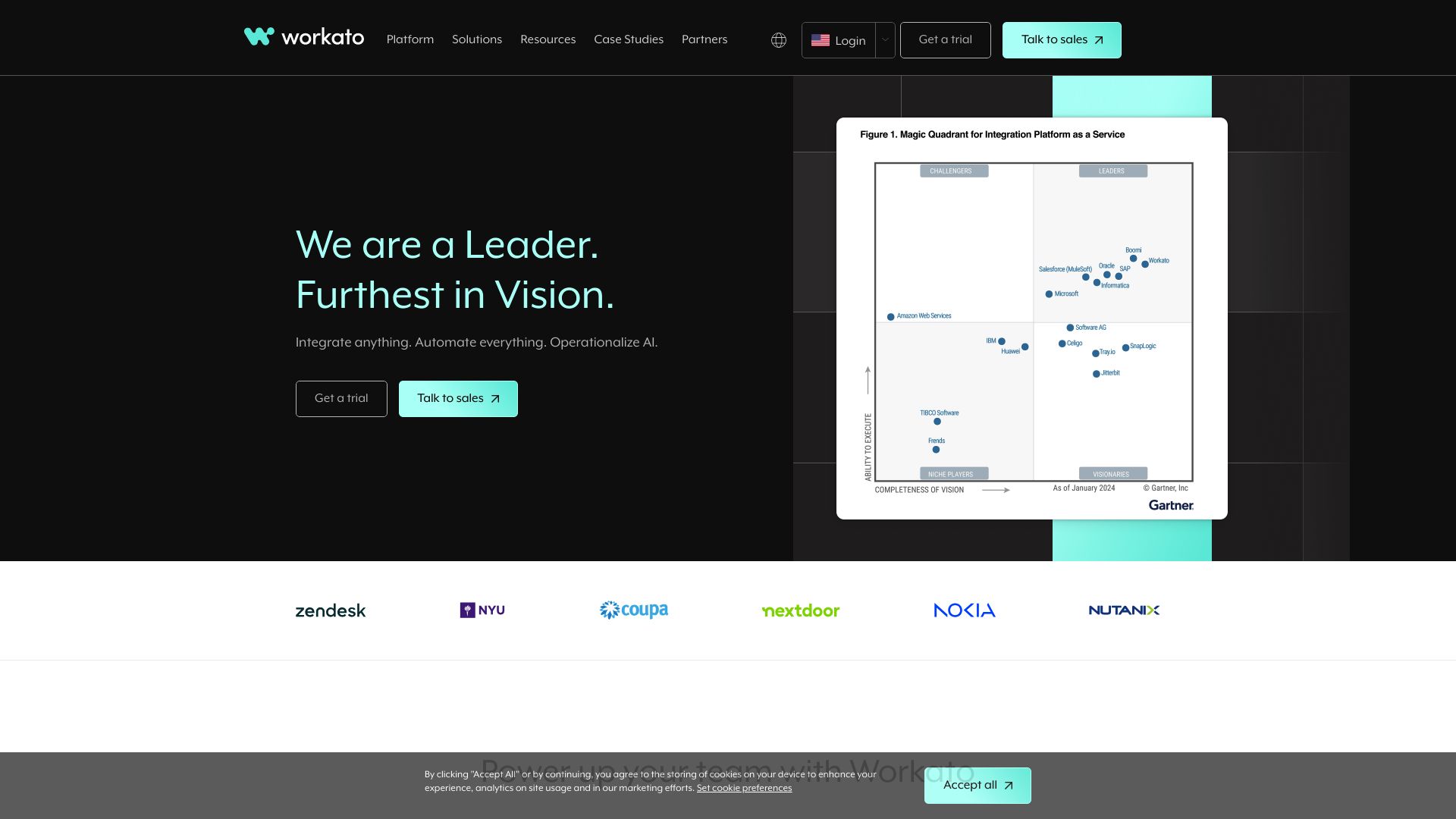LangChain vs. Workato: AI Automation Showdown
AI-powered automation revolutionizes business processes, but choosing the right platform can be daunting. Our comparison of LangChain vs. Workato, and SmythOS unveils the strengths and limitations of each, guiding you through their unique features and capabilities. LangChain empowers developers with powerful tools for AI application development, while Workato focuses on enterprise-grade workflow automation.
SmythOS emerges as a comprehensive solution, combining advanced AI agent development with user-friendly tools and versatile deployment options. Whether you’re a seasoned developer, business leader, or AI enthusiast, this analysis will help you navigate the AI automation landscape and select the platform that best suits your needs.
LangChain Overview
LangChain empowers developers to create sophisticated AI applications using large language models (LLMs). This open-source framework streamlines the entire LLM application lifecycle, from development to deployment. LangChain’s comprehensive toolkit includes LangGraph for building stateful agents, LangSmith for debugging and monitoring, and LangServe for deploying applications as APIs.


Developers leverage LangChain’s modular components to construct intelligent systems capable of context-aware interactions, complex reasoning, and autonomous task execution. The platform excels in natural language processing tasks, offering tools for text classification, question-answering, and conversational AI. LangChain’s integration capabilities allow seamless connection with popular AI models from OpenAI, Anthropic, and Hugging Face.
LangChain empowers developers to create sophisticated AI applications using large language models (LLMs). This open-source framework streamlines the entire LLM application lifecycle, from development to deployment.
While LangChain provides powerful tools for experienced developers, it may present a steeper learning curve for those new to AI development. The platform’s focus on flexibility and customization sometimes comes at the expense of out-of-the-box simplicity. Additionally, as an open-source project, enterprise-grade support and certain advanced features may require additional configuration or third-party solutions.
LangChain stands out in the competitive landscape through its emphasis on composability and extensibility. The LangChain Expression Language (LCEL) enables developers to chain components declaratively, optimizing for streaming, parallelization, and error handling. This approach allows for rapid prototyping and iterative development of complex AI workflows. As the field of AI continues to evolve, LangChain’s active community and frequent updates position it as a dynamic platform for cutting-edge AI application development.
Workato Overview
Workato stands out as a powerful enterprise automation platform, blending AI capabilities with robust workflow automation tools. The platform caters to businesses seeking to streamline operations and integrate AI into their existing processes without extensive coding knowledge.


Workato’s AI by Workato, developed in partnership with OpenAI, enables users to integrate AI models and prompts into their workflows. This feature supports tasks such as text analysis, categorization, email drafting, and translation, enhancing productivity across various business functions. The platform’s low-code/no-code interface makes it accessible to users with varying technical expertise, allowing for rapid automation development.
Workato’s AI by Workato… enables users to integrate AI models and prompts into their workflows… enhancing productivity across various business functions.
A key strength of Workato lies in its comprehensive workflow automation capabilities. The platform combines data storage, user interface design, and business logic in a unified experience. Features like Table Storage for secure data management and a drag-and-drop interface for UI customization empower users to create sophisticated, enterprise-grade applications. Workato also offers pre-built solutions and accelerators, such as the Knowledge Workbot Accelerator, which simplifies the integration of knowledge bases into enterprise applications.
Despite its strengths, Workato faces some limitations. The platform imposes rate limits on AI actions, potentially constraining high-volume use cases. Additionally, the lack of granular permission settings for AI features may raise concerns in organizations requiring strict access controls. While Workato’s enterprise focus ensures scalability and security, the associated costs might prove prohibitive for smaller organizations or those with limited budgets.
Workato’s marketplace, boasting over 1,500 connectors and community recipes, fosters a collaborative environment for automation development. This wealth of pre-built integrations and workflows accelerates implementation and promotes best practices across industries. However, users should be mindful of potential over-reliance on these pre-built solutions, which could limit customization in unique use cases.
In the evolving landscape of AI-powered automation, Workato positions itself as a comprehensive solution for enterprises looking to leverage AI and workflow automation at scale. Its blend of accessibility and advanced features makes it a compelling choice for organizations aiming to drive digital transformation and enhance operational efficiency.
Feature Comparison
LangChain and Workato offer distinct approaches to AI and automation, with notable differences in their core capabilities. LangChain excels in providing developers with powerful tools for building AI applications using large language models. Its LangGraph feature enables the creation of stateful, multi-actor applications, giving developers fine-grained control over AI agent behavior. In contrast, Workato focuses on enterprise-grade workflow automation with AI capabilities integrated into its platform.
A key differentiator lies in their security features. While LangChain emphasizes best practices for data handling, Workato provides more robust enterprise-level security measures, including encryption and compliance features critical for large organizations. However, LangChain offers greater flexibility in AI model integration, supporting various foundation models and Hugging Face integrations, which may appeal to developers seeking cutting-edge AI capabilities.
Neither platform fully matches SmythOS in combining advanced AI agent development with user-friendly visual building tools and comprehensive deployment options. SmythOS bridges this gap by offering a drag-and-drop interface for AI workflow creation, extensive API integrations, and support for multiple AI models, all while maintaining enterprise-grade security and scalability.
Feature Comparison Table
| LangChain | Workato | SmythOS | |
|---|---|---|---|
| CORE FEATURES | |||
| Visual Builder | ❌ | ✅ | ✅ |
| No-Code Options | ❌ | ✅ | ✅ |
| Autonomous Agents | ✅ | ❌ | ✅ |
| Multimodal | ✅ | ❌ | ✅ |
| Multi-Agent Collaboration | ✅ | ❌ | ✅ |
| Agent Work Scheduler | ❌ | ✅ | ✅ |
| SECURITY | |||
| Constrained Alignment | ❌ | ❌ | ✅ |
| IP Control | ❌ | ✅ | ✅ |
| COMPONENTS | |||
| Huggingface AIs | ✅ | ❌ | ✅ |
| Zapier APIs | ❌ | ❌ | ✅ |
| Data Lakes | ❌ | ❌ | ✅ |
| DEPLOYMENT OPTIONS (EMBODIMENTS) | |||
| Deploy as Webhook | ❌ | ✅ | ✅ |
| Staging Domains | ❌ | ✅ | ✅ |
| Production Domains | ❌ | ✅ | ✅ |
| Deploy as Scheduled Agent | ❌ | ✅ | ✅ |
| DATA LAKE SUPPORT | |||
| Hosted Vector Database | ❌ | ❌ | ✅ |
| Sitemap Crawler | ❌ | ❌ | ✅ |
| YouTube Transcript Crawler | ❌ | ❌ | ✅ |
| URL Crawler | ❌ | ❌ | ✅ |
| Word File Support | ❌ | ✅ | ✅ |
Best Alternative to LangChain and Workato
SmythOS emerges as the superior alternative to LangChain and Workato, offering a comprehensive platform for AI agent development and deployment. We combine advanced AI capabilities with user-friendly tools, bridging the gap between complex AI technologies and practical business applications.
Our visual builder sets SmythOS apart from LangChain’s code-centric approach. Users create sophisticated AI workflows through an intuitive drag-and-drop interface, eliminating the need for extensive programming knowledge. This democratization of AI development allows a broader range of professionals to harness the power of artificial intelligence.
SmythOS offers unparalleled flexibility in deployment options. Users can deploy their AI agents as APIs, webhooks, scheduled tasks, or even integrate them into popular platforms like ChatGPT.
Unlike Workato’s focus on traditional workflow automation, SmythOS specializes in AI-driven processes. Our platform supports autonomous agents capable of complex decision-making and multi-agent collaboration. These features enable businesses to automate intricate tasks and create dynamic, intelligent systems that adapt to changing environments.
SmythOS offers unparalleled flexibility in deployment options. Users can deploy their AI agents as APIs, webhooks, scheduled tasks, or even integrate them into popular platforms like ChatGPT. This versatility, combined with our robust security features and scalable infrastructure, makes SmythOS ideal for businesses of all sizes, from startups to large enterprises.
By choosing SmythOS, users gain access to a cutting-edge AI development platform that combines ease of use with powerful capabilities. Our solution empowers organizations to create, deploy, and manage AI agents efficiently, driving innovation and operational excellence across various industries.
Conclusion
LangChain, Workato, and SmythOS each offer unique approaches to AI-powered automation and development. LangChain excels in providing developers with powerful tools for building sophisticated AI applications, while Workato focuses on enterprise-grade workflow automation with integrated AI capabilities. Both platforms have their strengths, but also come with limitations that may impact certain use cases.
SmythOS emerges as a superior solution, combining the best aspects of both platforms while addressing their shortcomings. Our platform offers a user-friendly visual builder for creating AI workflows, extensive API integrations, and support for multiple AI models, all while maintaining enterprise-grade security and scalability. SmythOS’s “Create Once, Deploy Anywhere” approach allows for seamless integration across various environments, from chatbots to APIs and scheduled agents.
For businesses and developers seeking a comprehensive, flexible, and powerful AI automation platform, SmythOS stands out as the clear choice. Our solution democratizes AI development, making it accessible to both technical and non-technical users while providing the robustness required for enterprise-level applications.
To experience the future of AI automation and see how SmythOS can transform your workflows, create a free SmythOS account today. Discover our extensive library of AI agent templates to jumpstart your projects, and explore our comprehensive documentation for in-depth insights into our platform’s capabilities. Join the AI revolution with SmythOS and unlock unprecedented levels of efficiency and innovation for your organization.
Last updated:
Disclaimer: The information presented in this article is for general informational purposes only and is provided as is. While we strive to keep the content up-to-date and accurate, we make no representations or warranties of any kind, express or implied, about the completeness, accuracy, reliability, suitability, or availability of the information contained in this article.
Any reliance you place on such information is strictly at your own risk. We reserve the right to make additions, deletions, or modifications to the contents of this article at any time without prior notice.
In no event will we be liable for any loss or damage including without limitation, indirect or consequential loss or damage, or any loss or damage whatsoever arising from loss of data, profits, or any other loss not specified herein arising out of, or in connection with, the use of this article.
Despite our best efforts, this article may contain oversights, errors, or omissions. If you notice any inaccuracies or have concerns about the content, please report them through our content feedback form. Your input helps us maintain the quality and reliability of our information.
